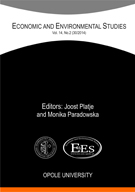Omani school and university students’ opinions about public transport: incentives and disincentives
Omani school and university students’ opinions about public transport: incentives and disincentives
Author(s): Neil Taylor, Edward Boyes, Ahmet Kilinc, Martin Stanisstreet, George Malandrakis, Abdullah AmbusaidiSubject(s): Economy
Published by: Uniwersytet Opolski
Keywords: beliefs; climate change; environmental education; global warming; Oman; private transport; public transport; views
Summary/Abstract: The global shift to private transport is impacting on the environment in a number of ways, including increases in vehicle emissions that, in turn, contribute to the major problem of global warming and potential climate change. This suggests a need to improve strategies to encourage greater use of public transport. The aim of this study is to explore which aspects of public transport might be perceived as reducing its popularity, and which might act as motivators to increase its use. In order to act as a motivator, a positive characteristic must be both believed to be true of public transport and viewed as an important issue by individuals. In contrast, negative characteristics that are viewed as important are likely to act as deterrents to the use of public transport. A questionnaire was used to determine the views of Omani school and university students about such characteristics. Comfort, safety and short journey time were viewed as important, but these characteristics were believed to be inferior for public transport. Surprisingly in a country where new, large and expensive private vehicles are common, the social status associated with using different forms of transport was seen as less important, and few respondents believed that using public transport was socially embarrassing. There were some differences in the responses of male and female respondents, with more females than males viewing comfort, safety and convenience in terms of travelling at preferred times as important. From an eco-centric perspective, although many respondents viewed it as important that personal transport should not exacerbate global warming, only half believed that public transport could make a contribution here. Many of Oman’s public transport issues are structural, but education may still have a part to play in encouraging the use of public transport. (Throughout the article we use 'private transport' to mean cars and 'personal transport' to mean transport of persons (i.e. buses or cars)).
Journal: Economic and Environmental Studies
- Issue Year: 14/2014
- Issue No: 2 (30)
- Page Range: 97-123
- Page Count: 27
- Language: English

